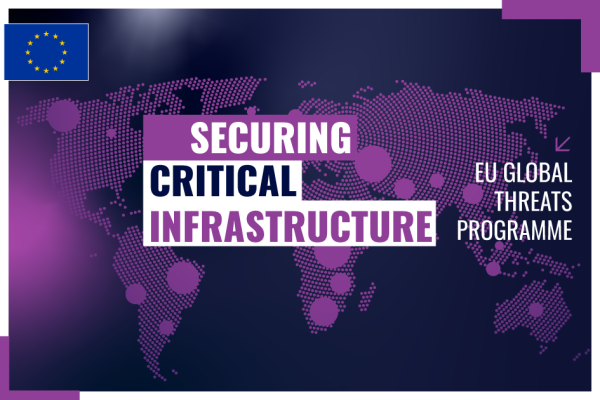The EU Global Threats programme is one of the EU’s main tools to tackle major security threats around the world, including terrorism, organised crime, cyberattacks, growing security risks linked to climate change, threats to maritime security, and CBRN risks.
Through a wide range of projects, we help countries and communities prevent and tackle security challenges, strengthen institutions and promote lasting stability.
The EU Global Threats programme is funded by NDICI-Global Europe and managed by the European Commission’s Service for Foreign Policy Instruments (FPI), putting EU foreign policy into action.
In today’s world, threats don’t stop at borders. Criminal networks, cyber risks, CBRN threats, environmental degradation and violent extremism affect communities across regions, and no country can face them alone. Without action, these threats can fuel conflict, weaken institutions and undermine global peace.
The EU Global Threats programme was created to respond to this reality. It complements national, bilateral and regional efforts by offering a global lens, connecting threats across regions and linking issues that are often addressed in silos. This integrated, holistic approach is the programme’s added value: strengthening the global response to threats that directly impact Europe’s security and its partners around the world.
The EU Global Threats programme targets global and transregional threats with direct relevance to European peace, security and resilience. Whether it’s tackling illicit trafficking routes that reach European shores, supporting neighbouring countries in managing CBRN risks, or preventing extremism online, every intervention is guided by how it contributes to shared security and long-term stability, while reinforcing the EU’s role as a trusted security partner worldwide.

Our focus and priorities
The EU Global Threats programme is part of the Peace, Stability and Conflict Prevention thematic pillar of the EU’s Multi-Annual Indicative Programme 2021–2027 (MIP) under the NDICI–Global Europe instrument. As such, it covers the global, multilateral and regional dimensions of the EU’s action. It supports the EU’s global role in addressing shared threats and promoting sustainable development, peace and security in line with the United Nations’ 2030 Agenda and the Paris Agreement. This framework is a key instrument for the external projection of EU’s policies, helping strengthen the EU as a global actor.
The work of the EU Global Threats programme focuses on five priority threat areas where EU support can make a real difference. Find out how today’s security challenges are connected and why tailored, coordinated responses are essential.

Building resilience to radicalisation, supporting local communities, improving law enforcement cooperation and addressing online radicalisation.

Supporting countries to prevent, detect and respond to threats involving chemical, biological, radiological and nuclear materials, agents or installations, whether from accidents, hazards or deliberate attacks.

Disrupting criminal networks along illicit routes while reinforcing border controls, fostering cross-border cooperation, exchange of information and intelligence.

Safeguarding essential systems, from transport hubs and maritime routes to digital networks, against physical and cyber threats that can disrupt lives and economies.

Tackling the impact of climate change and environmental degradation on peace and security in vulnerable regions, from conflict over resources to climate-driven displacement and destabilisation.
A values-driven and unique European response
The EU Global Threats programme puts human rights, gender equality and transparency at the heart of its work. These principles guide how we understand security threats and how we respond to them, ensuring that our actions not only respond to threats, but also strengthen rule of law and the legitimacy of democratic institutions in our partner countries.
Our approach is holistic and people-centred. We recognise that long-term security cannot be achieved without public trust, respect for human rights and gender equality, and the protection of vulnerable communities.
What makes the EU’s response unique is how we connect the dots: linking peace, security and development. With a strong global presence and trusted partnerships, we work to create lasting impact where it’s needed most.

General factsheet for the Global Threats programme, summarising its objectives and approach, threat areas covered, while outlining where projects are active.
- Threat area
- Counter-Terrorism, Prevention of Violent Extremism
- CBRN Risk Mitigation
- Fight against Organised Crime
- Critical Infrastructure Protection
- Climate change and security






